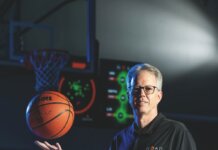
On the evening of July 31, 1984, in a matter of 49.8 seconds, Rowdy Gaines’ life changed forever.
In the McDonald’s Olympic Swim Stadium in Los Angeles, the Auburn University graduate touched the end of the pool and won the 100-meter freestyle, setting an Olympic record and winning the first of three gold medals he’d hang around his neck.
“It was like a fairy-tale ending to a long, long journey, that’s for sure,” says Gaines, who was in his swimming prime four years earlier and couldn’t compete because of the U.S. boycott against the Moscow Olympics. “It’s funny, because half of me feels like it was yesterday, and then the other half of me has no idea who that guy is.”
It was not yesterday. In fact, this summer marks 40 years after Gaines’ Olympics performance, an anniversary he’ll be marking in Paris by announcing his ninth Olympic Games for NBC.
The Olympics (July 26-Aug. 11) and Paralympics (Aug. 28-Sept. 8), both in Paris, may be more than 4,000 miles away, but the torch burns strong in Alabama, whether it’s the Paralympians training at Lakeshore Foundation in Birmingham or the many Olympic athletes, like Gaines, in the Alabama Sports Hall of Fame.
‘MURDERBALL’ AND MORE
The 2005 movie “Murderball” chronicled the training of the U.S. wheelchair rugby team leading up to the 2004 Paralympic Games in Athens, Greece. That training took place at the Lakeshore Foundation, which is also the ultra-physical sports’ governing body.
“It’s just part of what Lakeshore does, but it’s a big part,” says Chris Thomason, chief advancement officer at Lakeshore. “We are, of course, an official U.S. Olympic and Paralympic training site, which is just really cool, but we serve people from every walk of life. A third of our membership are senior adults, 60 and older. A third of our members join because of a disability, and another third of our members are veterans.”
Lakeshore’s facilities include a large swimming pool, gym for various sports, strength and weight-training equipment and the newly opened Sports Science and Training Center.
That center, which opened in January, was designed with Paralympians in mind, but it also hosts Olympians from time to time.
“Think of Colorado Springs or Lake Placid, New York, with the Olympic training centers in those places,” Thomason says. “We are very much like them.”

Athletes at Lakeshore are training in many sports, from swimming to track and field to fencing to blind soccer, but it’s wheelchair rugby and boccia (a precision ball sport similar to bocce) that are most prominent. Lakeshore is the governing body for both USA Wheelchair Rugby and Boccia United States, and both of those national teams train in Birmingham.
The U.S. has won seven medals in boccia since its introduction as a Paralympic sport in 1984, and the U.S. wheelchair rugby team has earned medals (two gold) in all four Paralympics it has entered.
The wheelchair rugby team includes Chuck Aoki, among the best wheelchair rugby players in the world, and Sarah Adam, the only woman to win a gold medal in wheelchair rugby, according to Thomason. Birmingham’s Jennifer Schuble, a five-time Paralympic medalist in para-cycling, also trains at Lakeshore.
A July 26 event, Celebration of Champions, at Lakeshore will raise money for the athletes there prepping for the Paralympics, as well as supporting the foundation’s adaptive sports programs. The fundraising goal is $200,000.
“These are elite athletes, so they have to spend an enormous amount of time training to be the best at what they do,” Thomason says. “Many of them have part-time jobs, and a few will have full-time jobs when their companies are willing to work around their schedules. But what you end up with is people with disabilities are not represented in the employment sector. A much higher percentage of people with disabilities are unemployed, and then you throw in the training for your athletes and they have to deal with that. … We raise money to help figure that out, and then we also advocate for our athletes in communities and with businesses across the country from a government perspective.”
Thomason says he’s continuously inspired by the athletes he sees at Lakeshore.
“There’s a really, really strong work ethic and a desire to be seen as the athlete that they are and not necessarily a disabled athlete,” he says. “They don’t put up with whining or feeling sorry for yourself or anything like that. They deal with what they have and absolutely make the best of it.”
And Lakeshore Foundation has been successful in helping them.
Since 2003, when the facility was designated an official Olympic and Paralympic training site, it has produced 52 Paralympic athletes, coaches and staff, with those athletes winning 30 Paralympic medals.
THE DRAW OF THE OLYMPICS

Olympic medals also abound at the Alabama Sports Hall of Fame. Some are on display at the hall of fame in downtown Birmingham, which has inducted more than 30 Olympic medalists since its formation in 1967.
“The Olympics are big across the globe, and Alabama is no exception,” says Scott Myers, executive director of the ASHOF. “Our Olympians here are a natural draw, and it probably does increase attendance around the Olympics.”
Myers points to the array of athletes represented in the ASHOF, including:
- Jesse Owens, the track and field legend from Oakville who won four gold medals at the 1936 Olympic Games in Berlin.
- Jennifer Chandler, who won the gold in the women’s three-meter springboard event at the 1976 games in Montreal. The Langdale native, as well as Rowdy Gaines, worked at the ASHOF at one point. She also worked at the Lakeshore Foundation.
- Vonetta Flowers, the Birmingham native, University of Alabama at Birmingham graduate and bobsledder. At the 2002 Winter Olympics in Salt Lake City, she became the first Black woman to win gold in a Winter Olympics event.
- Charles Barkley, the Leeds native and Auburn University graduate, led basketball’s “Dream Team” to gold at the 1992 Olympics in Barcelona and repeated four years later in Atlanta.
- Evander Holyfield, born in Atmore, won a bronze medal at the 1984 Olympics in Los Angeles before becoming boxing’s heavyweight champion.
- Mia Hamm, a Selma native, won gold with the women’s soccer team in 1996 in Atlanta and 2004 in Athens, and silver in Sydney in 2000.
That just scratches the surface, Myers says.
“There are a lot of great storylines relating to Alabama Olympians,” he says.
He can’t say for sure every Alabamian who has earned an Olympic medal is in the ASHOF, but it’s possible.
“It’s one of those achievements like the Heisman Trophy,” he says. “Winning a Heisman Trophy doesn’t guarantee you a spot in the Hall of Fame, but it does look good on a resume, right?”
For Gaines, it was a game-changer.
“My life would have looked a lot different if I didn’t have that Olympic experience, and especially the Olympic performance that I had,” he says. “I probably would have had another career. It would have been completely different.”
Alec Harvey is executive editor of Business Alabama. He is based in Birmingham.
This article appears in the July 2024 issue of Business Alabama.



